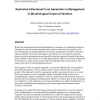Free Online Productivity Tools
i2Speak
i2Symbol
i2OCR
iTex2Img
iWeb2Print
iWeb2Shot
i2Type
iPdf2Split
iPdf2Merge
i2Bopomofo
i2Arabic
i2Style
i2Image
i2PDF
iLatex2Rtf
Sci2ools
IR
2007
2007
Restricted inflectional form generation in management of morphological keyword variation
Word form normalization through lemmatization or stemming is a standard procedure in information retrieval because morphological variation needs to be accounted for and several languages are morphologically non-trivial. Lemmatization is effective but often requires expensive resources. Stemming is also effective in most contexts, generally almost as good as lemmatization and typically much less expensive; besides it also has a query expansion effect. However, in both approaches the idea is to turn many inflectional word forms to a single lemma or stem both in the database index and in queries. This means extra effort in creating database indexes. In this paper we take an opposite approach: we leave the database index un-normalized and enrich the queries to cover for surface form variation of keywords. A potential penalty of the approach would be long queries and slow processing. However, we show that it only matters to cover a negligible number of possible surface forms even in morpho...
| Added | 15 Dec 2010 |
| Updated | 15 Dec 2010 |
| Type | Journal |
| Year | 2007 |
| Where | IR |
| Authors | Kimmo Kettunen, Eija Airio, Kalervo Järvelin |
Comments (0)

